| dc.contributor.editor | Diekmann, Marie | |
| dc.contributor.editor | Theuvsen, Ludwig | |
| dc.contributor.editor | Weinrich, Ramona | |
| dc.date.accessioned | 2020-09-09T09:21:46Z | |
| dc.date.available | 2020-09-09T09:21:46Z | |
| dc.date.issued | 2020 | |
| dc.identifier.uri | https://doi.org/10.17875/gup2020-1331 | |
| dc.format.extent | 160 | |
| dc.format.medium | Print | |
| dc.language.iso | ger | |
| dc.rights.uri | http://creativecommons.org/licenses/by-sa/4.0/deed.de | |
| dc.subject.ddc | 630 | |
| dc.subject.other | OAPEN | |
| dc.title | Sustainability Transitions in der Lebensmittelproduktion | |
| dc.title.alternative | Alternative Proteinquellen in soziotechnischer Perspektive | |
| dc.type | anthology | |
| dc.price.print | 27,00 | |
| dc.identifier.urn | urn:nbn:de:gbv:7-isbn-978-3-86395-457-4-5 | |
| dc.description.print | Softcover, 17x24 | |
| dc.subject.division | peerReviewed | |
| dc.subject.subjectheading | Agrarwissenschaften | |
| dc.relation.isbn-13 | 978-3-86395-457-4 | |
| dc.identifier.articlenumber | 8102076 | |
| dc.identifier.intern | isbn-978-3-86395-457-4 | |
| dc.subject.bisac | SCI086000 | |
| dc.subject.vlb | 678 | |
| dc.subject.bic | T | |
| dc.description.abstractger | Die Agrar- und Ernährungsbranche bietet ein großes Potenzial für die gesellschaftliche Transformation zugunsten einer höheren Nachhaltigkeit. Insbesondere von dem Verzicht auf den Konsum von Lebensmitteln tierischen Ursprungs wird eine deutliche Verringerung der ernährungsbedingten Treibhausgasemissionen erwartet. Dennoch weist die Entwicklung der Konsumgewohnheiten eher auf einen gegenläufigen Trend hin: Auf globaler Ebene steigt die Nachfrage nach tierischen Produkten und damit einhergehend die Nachfrage nach Futtermittelkomponenten – allen voran Rohprotein, das bislang vorwiegend durch die Sojaproduktion in Nord- und Südamerika bereitgestellt wird, die jedoch unter wirtschaftlichen, gesellschaftlichen und ökologischen Aspekten kritisch zu hinterfragen ist. Um den weiterhin steigenden Proteinbedarf für die Ernährung der Weltbevölkerung zu sichern, ist die Ermittlung und Analyse geeigneter alternativer Proteinquellen für die Human- und Tierernährung von zentraler Bedeutung. Vor diesem Hintergrund beschäftigte sich das von 2014 bis 2019 durch das Niedersächsische Ministerium für Wissenschaft und Kultur im Rahmen der Maßnahme „Wissenschaft für nachhaltige Entwicklung“ aus Mitteln des Niedersächsischen Vorab geförderte Verbundprojekt „Sustainability Transitions in der Lebensmittelproduktion: Alternative Proteinquellen in soziotechnischer Perspektive“ mit der Potenzialabschätzung
von Algen und Insekten als alternativen Proteinquellen für die europäische Agrar- und Ernährungsbranche. Der Ansatz des Verbundprojektes fokussiert im Sinne der „sustainability transition“ auf den Wandel soziotechnischer Systeme hin zu einer höheren Nachhaltigkeit von Produktion und Konsum. Dabei wird die soziotechnische Transition in Richtung einer Erhöhung der Nachhaltigkeit hinsichtlich mehrerer Dimensionen – technologisch, materiell, wirtschaftlich und soziokulturell – untersucht. Der vorliegende Sammelband gibt einen Überblick über die zentralen Ergebnisse. | |
| dc.description.abstracteng | The agricultural and food sector offers great potential for social transformation toward greater sustainability. In particular, the renunciation of the consumption of food of animal origin is expected to significantly reduce diet-related greenhouse gas emissions. Nevertheless, the development of consumer habits tends to point to an opposite trend: On a global level, the demand for animal products is increasing and with it the demand for feed components - above all raw protein, which has so far been provided mainly by soybean production in North and South America, but which must be critically examined from an economic, social and ecological perspective. In order to secure the continuously increasing protein demand for the nutrition of the world population, the identification and analysis of suitable alternative protein sources for human and animal nutrition is of central importance. Against this background, the collaborative project "Sustainability Transitions in Food Production: Alternative Protein Sources in a Socio-Technical Perspective", which was funded by the Lower Saxony Ministry of Science and Culture from 2014 to 2019 within the framework of the "Science for Sustainable Development" measure, dealt with the assessment of the potential of algae and insects as alternative protein sources for the European agricultural and food industry. The approach of the joint project focuses on the change of sociotechnical systems towards a higher sustainability of production and consumption in the sense of "sustainability transition". The socio-technical transition towards an increase in sustainability is being investigated in terms of several dimensions - technological, material, economic and socio-cultural. The present anthology provides an overview of the central results. | |
| dc.subject.eng | sustainability | |
| dc.subject.eng | food | |
| dc.subject.eng | alternative protein sources | |
| dc.notes.vlb-print | lieferbar | |
| dc.intern.doi | 10.17875/gup2020-1331 | |
| dc.identifier.purl | http://resolver.sub.uni-goettingen.de/purl?univerlag-isbn-978-3-86395-457-4 | |
| dc.format.chapters | - | |
| dc.identifier.asin | 3863954572 | |
| dc.subject.thema | T | |



